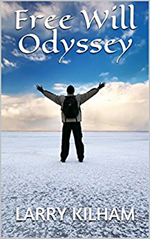Retired engineer and entrepreneur Larry Kilham is the author of four science fiction novels, two memoirs, and four other nonfiction books with topics ranging from creativity and invention to artificial intelligence and digital media. Free Will Odyssey (2017) is Larry’s most recent fiction work. You’ll find him on his website LarryKilham.net and on his Amazon author page.
 What is your elevator pitch for Free Will Odyssey?
What is your elevator pitch for Free Will Odyssey?
Peter Tesla, a prodigious young inventor, develops an electronic device using artificial intelligence (AI) and virtual reality to enhance the user’s free will. A major application is drug detoxification. Peter’s star client is the U.S. president. Along the way, Peter is tried for the mysterious death of a girlfriend and struggles with the schemes of a secretive industrialist.
What sparked the initial story idea for the book?
The story idea evolved. I started out writing about free will, and as I followed my characters, they challenged me with the rest of the story ideas. I’m very curious, and as my characters’ predicaments suggested solutions, I researched these with Google and in my extensive library.
Share a little about your main character.
The story is told in the first person. The main character, a technology entrepreneur, is largely a composite of my father and me. We were both entrepreneurs who started small companies. Most of the other characters—lawyers, engineers, high-tech business moguls, etc.—come from my business experience.
What unique challenges did this work pose for you?
Learning about free will, mind enhancing electronics, and drugs. These are all difficult because there are no clear-cut truths. They are all areas of current research. Criminal court dialogue took a lot of effort. I Googled sample court dialogues developed for law students, and I submitted my drafts to lawyer friends.
What was the most rewarding aspect of writing Free Will Odyssey?
Stumbling into a potentially important new method of drug dependency treatment and, through the medium of a novel, publicizing it. I hope I can add to the chorus of writers who say that by various methods we can greatly improve the drug rehabilitation process.
How did the book come together?
The novel took about six months to write, a couple of months to edit with several editors including Larry Greenly (of SouthWest Writers), and two months to design the cover, prepare the manuscript in pdf, and submit to Kindle and CreateSpace. I designed the cover myself using a photo from Shutterstock. While that was going on, I also worked with a professional narrator to produce the audiobook.
Was there anything surprising you discovered while doing research for this book?
I was surprised by the vast range of differing opinions about what free will is and if it exists at all. Free will has always interested me philosophically. Dostoyevsky used it as a theme in Crime and Punishment, Saint Thomas Aquinas studied it, and popular psychology magazines have recently reviewed free will in terms of current problems like drug addiction.
 The Juno Trilogy—Love Byte (2013), A Viral Affair (2013), and Saving Juno (2014)—explores whether natural or artificial intelligence will dominate the future. What challenges did you experience in writing this series?
The Juno Trilogy—Love Byte (2013), A Viral Affair (2013), and Saving Juno (2014)—explores whether natural or artificial intelligence will dominate the future. What challenges did you experience in writing this series?
My biggest challenge was writing entirely for fiction readers. Generally, they are new to AI and often reticent about reading stories involving AI. Fortunately, when I was writing The Juno Trilogy, I joined a writing workshop in Santa Fe. We read our chapters to each other every week. The feedback was very helpful.
What first inspired you to become a writer?
I first thought about becoming a writer when, to my surprise, I was picked to be the features editor for my college newspaper. Thirty-five years later, I decided to try writing a book after I was encouraged by my writing instructor, author Joan Torres, at our local community college. The only writing I did before that was trade magazine articles which were, if I may say so, quite good. I didn’t write books earlier because I had to make a good living through a lot of adventurous business travel. Let’s face it, writing generally is a tough way to make a living, let alone prosper.
What writing project are you working on now?
My project for 2018 is to write about my father Peter Kilham who was a great designer, inventor, and visionary. Through a compelling sense of purpose and perfection, he invented bird feeders which brought millions of people happiness. I will share my conversations with him along the way. Everyone can draw inspiration from his story. The book will be something like Zen and the Art of Motorcycle Maintenance and Tuesdays with Morrie.
 KL Wagoner (writing as Cate Macabe) is the author of This New Mountain: a memoir of AJ Jackson, private investigator, repossessor, and grandmother. She has a new speculative fiction blog at klwagoner.com and writes about memoir at ThisNewMountain.com.
KL Wagoner (writing as Cate Macabe) is the author of This New Mountain: a memoir of AJ Jackson, private investigator, repossessor, and grandmother. She has a new speculative fiction blog at klwagoner.com and writes about memoir at ThisNewMountain.com.

